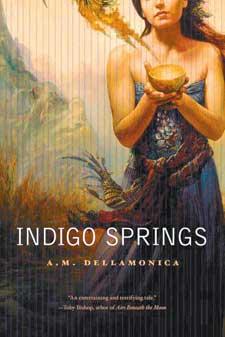
Credit: Courtesy of Alyx Dellamonica
Both figuratively and literally, Alyx Dellamonica’s striking first novel is a fantasy about secrets bubbling to the surface and the victims they leave in their wake.
In an early scene in the magic-fantasy novel Indigo Springs, protagonist Astrid Lethewood discovers that the source of the gurgling noise in the house she inherited from her father is a secret stash of magical blue fluid. This newfound “vitagua” explodes in her face and sends a brick flying into the head of her best friend and secret crush, Sahara.
At first, Astrid’s discovery of magic is wonderful and thrilling, but as the novel’s apocalyptic framing makes clear, releasing secrets can have dangerous consequences.
“I really started with the idea of Astrid after the fact of this huge disaster, having caused this terrible outbreak of magic that could not be contained,” says Dellamonica. “I wanted to write about someone who’s dealing with the aftermath of a mistake, and it sort of spilled out from there.”
Astrid’s world is full of secrets. There’s her father’s lifelong alchemical work, disguised as “antiquing” with the aid of spells that erase Astrid’s memory of the magic. And there’s Astrid’s mom, whose obsession with a series of pulp detective novels masks her own transgendered identity.
Dellamonica says that discovering the secret worlds of our parents is a compelling theme for her.
“I am from Generation X and I think as a sociological group we came into adulthood feeling very free to be very critical of our parents, to look at the baby boomers and their choices and say ‘that’s not what I would have done.’
“I see a freedom among Gen Xers to look into our background and criticize. As queer people we have some extra freight to do that because we often deal with homophobia in the family.”
Astrid keeps her own secrets, guarding her true feelings for her seemingly straight friend Sahara, but also having feelings for her stepbrother, Jackson, the town’s most eligible bachelor.
The constantly shifting sexual dynamics of the three protagonists means sex is always simmering under the surface of the story’s magical adventures.
“I think magic is sort of inherently sexy,” Dellamonica says. “They get a lot of magical objects that accentuate that sense of sexiness. Astrid, who doesn’t have a lot of faith in her appearance, gets this lipstick that’s too powerful for her.
“It was not wrong of Kissinger to refer to power as an aphrodisiac, and the vitagua can do anything Astrid can reasonably imagine. Obviously I’m eroticizing it in the way I’m writing about it. What Sahara falls for isn’t particularly physical, it’s that she can do whatever she wants. She uses the sex to get access to magic, not magic to get access to sex.”
That attraction to power is part of why Dellamonica enjoys writing fantasy fiction.
“It’s the artistic creation of an entire milieu,” she says. “I like having control over the entire universe that I’m writing in.”
But ultimately, it’s the engaging characters that make Indigo Springs such a fulfilling novel.
“I like Astrid because she’s a good person, essentially. She tries hard, she lives a simple life, she’s the best expression of one type of person I’d like to be. She’s unfailingly kind to people. She works hard and tries to do the right thing,” says Dellamonica.
As for Sahara, Dellamonica was inspired to create the cunning sexpot from her real-life friendships.
“Sahara is charming. I’ve had the good fortune many times in my life to have charming friends, and it’s such a joy to be with them when they’re lighting up the room in a dozen different ways,” she says. “She obviously has a big downside too: she’s narcissistic and selfish, but she’s easily hurt.”
Dellamonica, who jokingly refers to herself as bisexual, bigendered and bisectional (meaning she sings both alto and soprano in the Vancouver Lesbian and Gay Choir), grew up in a handful of small towns in Canada and the US before settling in Lethbridge, Alberta for university, where she studied theatre.
“Pretty much as soon as the ink was dry on our diplomas, my now-wife and I moved out to British Columbia and we’ve been here since,” she says with a laugh.
Now splitting her time between writing and teaching at UCLA through its online extension program, Dellamonica’s been publishing short sci-fi and fantasy fiction for nearly 20 years. Indigo Springs is her first novel and was finished in the weeks leading up to the legalization of same-sex marriage.
“It went out in 2003, literally weeks before the law changed and we could get married, and then I was all wrapped up into getting married,” she says. “It feels like we’ve been waiting for this thing to happen for a real long time. That adds to the sense of amazement and accomplishment. When you wait a long time for something, there’s a sense of disbelief when it finally comes.”


 Why you can trust Xtra
Why you can trust Xtra


